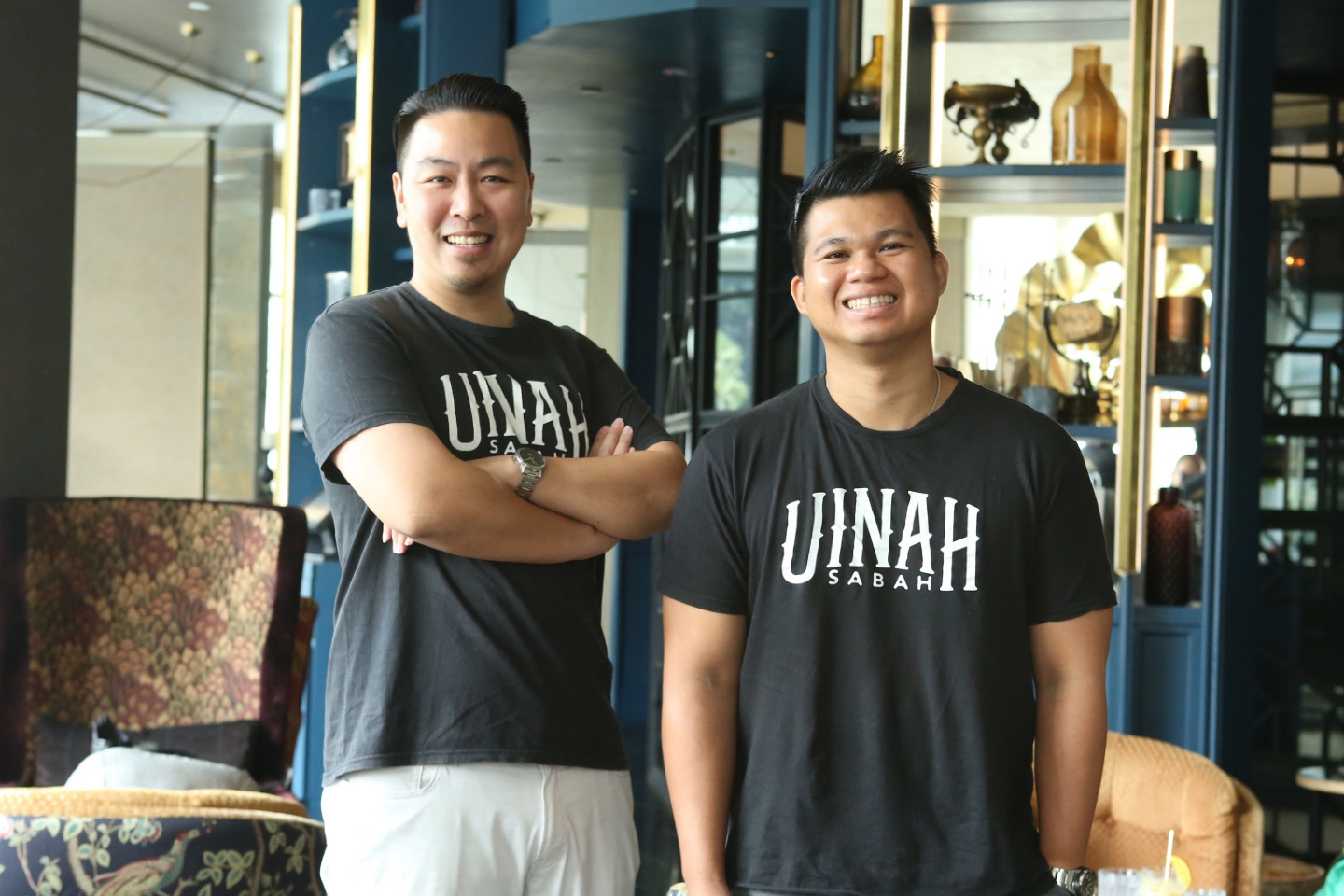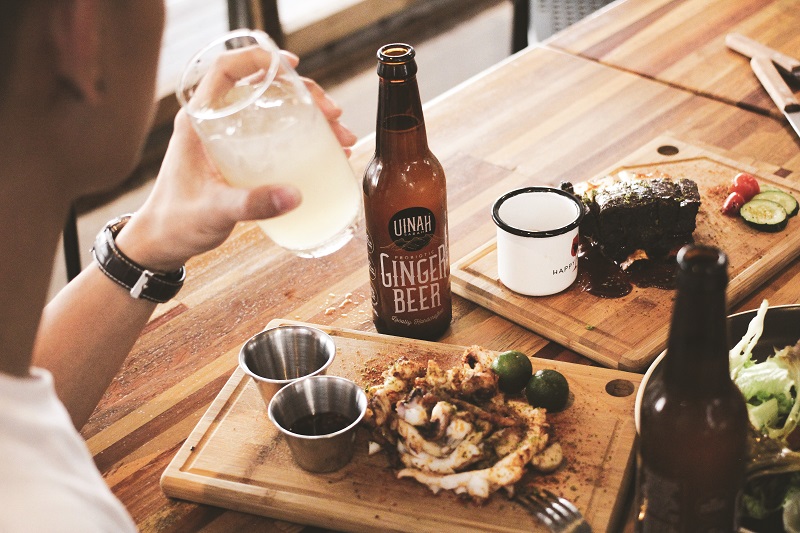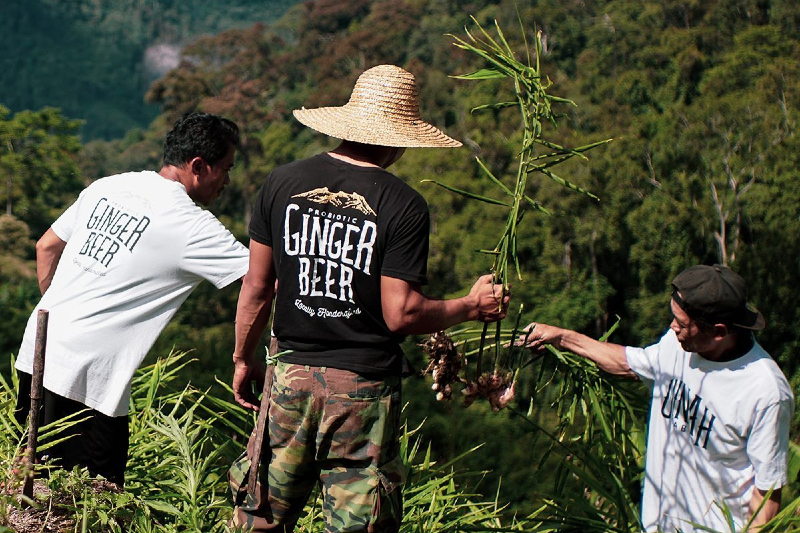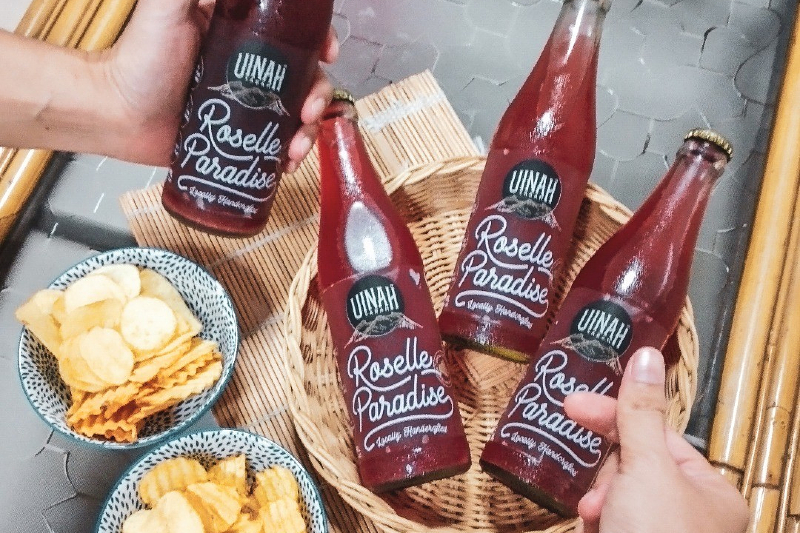
Wong (left) and Liew (Photo: Suhaimi Yusuf/The Edge)
In the cool of Sabah’s hilly Tambunan region, a fiery rhizome grows. Consumers in Peninsular Malaysia might tout the virtues of Bentong ginger, but James Wong and Matthias Liew would throw Tambunan’s hat into the ring as contender for the best variant. So convinced are they of the quality of this organic crop that they have made it the heart of their debut product.
The childhood friends are the founders of Uinah Sdn Bhd and its subsidiary, Uinah Premium Craft Beverages. The name is Sabahan slang for “wow” or “amazing”, a fitting tribute to its flagship product, Uinah Ginger Beer. Launched in 2018, the punchy drink is made from pesticide-free and sustainably grown ginger.
Wong, who runs a construction firm, developed a fondness for Bundaberg Ginger Beer while pursuing a master’s in architecture in New Zealand. He began experimenting with recipes upon his return to Sabah a decade ago, introducing the drink to his circle of friends — commercial diver Liew among them. The two believed ginger beer made from the spicy harvest had commercial potential but were driven by a bigger motivation than profit.
uinah_3.jpg

“So much of our best-quality products are exported in raw form, from Sabahan rice and ginger to timber,” says Wong. “Another country buys it, manufactures it into a product and sells it back to us at a high margin. We felt we could upscale and add value to our premium ingredients.”
Another pet peeve was that souvenirs in tourist shops use the Sabah name but are of Chinese origin. The duo believed that compared with the rather ordinary products in Taiwan or Japan that had gained cult followings largely because of their good branding, Sabah’s natural resources — such as ginger planted as part of a crop rotation scheme in fertile soil blessed with volcanic nutrients — were superior but needed a marketing makeover. Uinah Ginger Beer was a foot in the door of the international retail market.
“We had been perfecting the recipe for about a year when an opportunity came to participate in the Jesselton Artisan Market in Kota Kinabalu,” says Liew. “We prepared 800 bottles for the weekend event and sold out by lunchtime on both days. We doubled our inventory at the next bimonthly market and saw a similar response.”
“We thought our customers would be the younger generation but it was really the older people who appreciated the idea of a gingery drink,” continues Wong. “They were familiar with the many benefits of ginger and liked that our version isn’t too sweet. One lady in confinement even called us to complain that we sold out too early — ginger is popular for its healing and warming properties, and she wanted our drink. We were shocked.”
uinah_ginger_beer.jpg

It set the tone for the reception to come. In the early days, the co-founders worked out of Wong’s kitchen, eventually encroaching into his backyard and then taking over most of his house with pallets of the products.
“When we first started, we were making 3,000 to 4,000 bottles of Uinah Ginger Beer ourselves, manually pouring the hot beverage into glass bottles with a funnel,” says Liew. “We don’t use artificial ingredients, flavours or preservatives, so making this commercially viable was a challenge.”
Raw ingredients are boiled down to a reduction and then treated with forced carbonation and brewed. Although it has an alcohol content of 1.1%, the beverage is classified as non-alcoholic as the alcohol is produced through a natural fermentation process. High demand has warranted the opening of a semi-automated production facility to produce 1.5 million bottles a year. Uinah Ginger Beer is stocked at supermarkets and pharmacies (ginger alleviates nausea and stomach upsets) in Sabah and recently arrived in Peninsular Malaysia.
Ginger might have been the launch pad of the brand, but Uinah celebrates excellence in all manner of local resources and produce, so expansion of its range was written into its blueprint. Uinah Roselle Paradise features hand-harvested Sabahan roselle flowers with hints of lemon and ginger. Experiments with passion fruit, dragon fruit and guava are in the works. To focus on this business, Liew left his career in the tourism and, later, oil and gas industries to oversee day-to-day operations while Wong, still a practising architect, devotes much time to growing the company.
“I never saw myself doing something like this but after studying the business, its mission and the impact we could have on partners like the local farmers, I knew I wanted to be part of it,” Liew says.
roselle_paradise.jpg

His partner expounds: “Uinah started off as a hobby but then we realised the good we could do at the grassroots level. If you visit the farmers in Kundasang, they sell vegetables like cabbage for just a few cents, but the prices are marked up tremendously by middlemen. Buying directly from the farmers has shown us how small decisions businesses make can have a huge impact on the local community.
”Working on Uinah brings a lot of satisfaction and pride. One day we were mixing drinks in a backyard and suddenly we are expanding and hitting milestones. It’s an adrenaline rush, knowing two lads from Sabah could make this work, and it gives us hope that Malaysia can compete against the big boys of the world.”
They plan on going regional and then international — particularly the Australian market, home of Bundaberg Ginger Beer.
“I really want to get our version there because I think people will like it; it’s less sweet and has a stronger ginger kick,” says Wong. “It goes especially well with greasy food like chicken wings and burgers, and even Malaysian dishes like satay, as the ginger cuts through the oiliness.”
Liew, meanwhile, has several preferred methods of consumption. “I’m not much of a beer or cocktail drinker but if you want a hint of alcohol in your glass, ginger beer goes well with vodka. If you aren’t in the mood for alcohol but want to hang out at a bar, our bottle’s design allows you to feel comfortable blending in with the crowd. My wife and I bring ginger beer along on diving trips because it warms you up quickly when you get out of the cold water. It also makes a great dessert — pour some into a glass and top it with a scoop of vanilla ice cream.”
This article first appeared on Apr 27, 2020 in The Edge Malaysia.


